Regaining our sense of wonder
By BISHOP JOEL M. KONZEN, SM | Published September 19, 2024 | En Español
From time to time we get reminders that our human experience, including our spiritual life, is composed of both rational and emotional awareness. We use our reason to think through the truth of a statement, and we use our emotions to register a reaction or a feeling elicited by something that has occurred, something we have sensed. Together they form the way we process what we encounter.

Bishop Joel M. Konzen, SM
An element that originates in our emotions but causes us to reflect, to contemplate, is wonder. Wonder is experienced especially in relation to the natural world—a walk in the woods, a careful look at the night sky, or being captivated by the behavior of animals. The sight of a newborn, or holding that new child, occasions a sense of awe at creation and at the marvel of human life. This is wonder.
In the spiritual realm, wonder is a door to the mystical—contemplating the depth of our relationship with God, recognizing the miracle of our being loved by God unconditionally, and dwelling on the way that God desired that a sinful world would be reconciled through the gracious action, the sacrifice, of his son.
One of the results of our increasingly technology-driven lives is that we have parted company with ordinary wonder. When people are out for a run or are walking the dog, the closest that many may come to ‘being in touch with nature,’ they are often wired with a podcast or scanning their messages, in which nature itself is obscured by the intrusion of crafted experiences. Otherwise, we are driving a vehicle or riding, when we are also minding the sounds and sights generated by electronics to occupy our attention.
This reality is what urges us to come away to a place where we can regain a primal sense of wonder, wonder at the natural world and wonder at the grandeur of God and all that he has given us. Failure to take the time to be fascinated by God’s workings can lead to a sense that we are being overwhelmed, that forces from beyond ourselves are reducing our appreciation for the gift of life itself. Jesus found that he had to remove himself from the fray, from the outside influences, from the crowd, in order to reorient himself in prayer and solitude.
When we begin to feel that, in the words of the poet Wordsworth, “the world is too much with us,” it’s time to take ourselves out of the busyness of our many concerns and regain our wonder, which inspires thankfulness and awe, without which we are only partially alive in our surroundings. Our retreat houses have areas in which we can regain that sense of wonder at all that God has placed at our disposal. Some parishes have prayer gardens that allow us to do the same. Spending time in adoration of the Blessed Sacrament is an opportunity to regain the equilibrium that comes from knowing God in the intimacy of his son’s loving presence. And people who like to hike or to experience the Camino de Santiago in Spain or to watch the waves roll in at the ocean find that this is the way that they recapture a sense of awe and a simpler manner of being, if only for a time.
It is not easy in our production-oriented society to be comfortable giving ourselves over to wonder, to revel in the beauty of God’s manifest displays. I think of the title of C. S. Lewis’s memoir, “Surprised by Joy,” (another line from Wordsworth) when I think of wonder, because that is what it is: a small, joyful surprise. We don’t live well without these small surprises. If it has been a while since you’ve experienced wonder, put down the phone, get away from the computer, and find that space that allows you to utter a spontaneous prayer of thanks for having been startled out of the stupor of our habitual servitude to all that is not God.